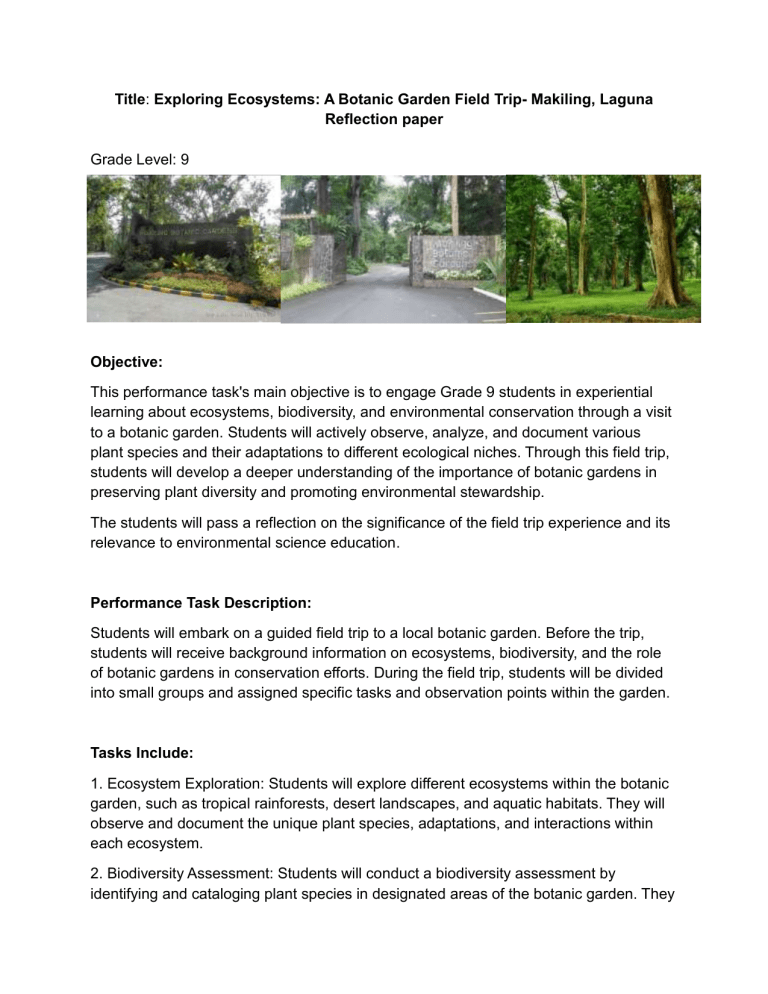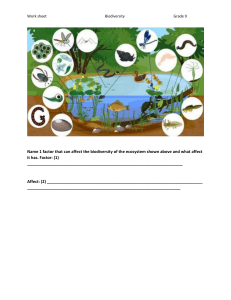
Title: Exploring Ecosystems: A Botanic Garden Field Trip- Makiling, Laguna Reflection paper Grade Level: 9 Objective: This performance task's main objective is to engage Grade 9 students in experiential learning about ecosystems, biodiversity, and environmental conservation through a visit to a botanic garden. Students will actively observe, analyze, and document various plant species and their adaptations to different ecological niches. Through this field trip, students will develop a deeper understanding of the importance of botanic gardens in preserving plant diversity and promoting environmental stewardship. The students will pass a reflection on the significance of the field trip experience and its relevance to environmental science education. Performance Task Description: Students will embark on a guided field trip to a local botanic garden. Before the trip, students will receive background information on ecosystems, biodiversity, and the role of botanic gardens in conservation efforts. During the field trip, students will be divided into small groups and assigned specific tasks and observation points within the garden. Tasks Include: 1. Ecosystem Exploration: Students will explore different ecosystems within the botanic garden, such as tropical rainforests, desert landscapes, and aquatic habitats. They will observe and document the unique plant species, adaptations, and interactions within each ecosystem. 2. Biodiversity Assessment: Students will conduct a biodiversity assessment by identifying and cataloging plant species in designated areas of the botanic garden. They will use field guides and digital resources to classify plants based on their characteristics and ecological roles. 3. Adaptations Investigation: Students will examine plant adaptations to environmental conditions such as water availability, temperature, and soil type. They will identify specific adaptations, such as leaf morphology, root structures, and reproductive strategies, that enable plants to thrive in diverse habitats. 4. Environmental Impact Analysis: Students will analyze the human impact on the environment and biodiversity conservation efforts within the botanic garden. They will evaluate sustainable practices, conservation initiatives, and educational programs aimed at raising awareness about environmental issues. 5. The reflection should contain a minimum of 50 words excluding the articles and conjunctions used. Performance Criteria: Students will be assessed based on their active participation, observational skills, data collection, analysis, and presentation of findings. Criteria for assessment include: - Accuracy and thoroughness of plant identification and documentation - Depth of understanding of plant adaptations and ecological concepts - Critical analysis of environmental challenges and conservation strategies - Clarity and coherence of presentation or report summarizing field trip findings Conclusion: Through this performance task, Grade 9 students will not only gain practical experience in field biology but also cultivate a sense of environmental awareness and responsibility. By connecting classroom learning with real-world observations and experiences, students will develop a deeper appreciation for the complexity and beauty of natural ecosystems and the importance of conservation efforts in safeguarding biodiversity for future generations.

